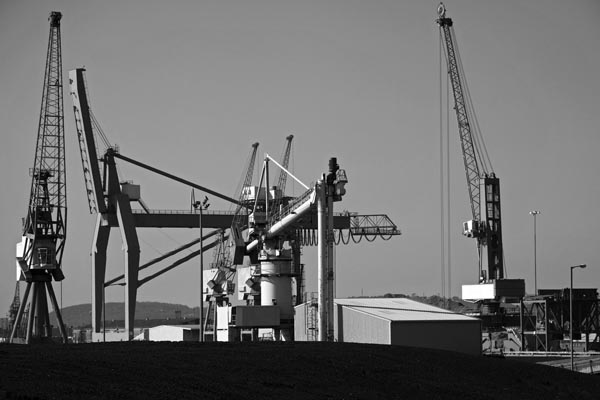While Britain cowers at the prospect of over a million consciously created job losses, the direct result of the diktat of the government’s public sector funding cuts, workers should consider the true state of Britain’s economy, how fragile and crippled Britain really is under the rule of finance capital...
For a 21st-century industrial revolution!
WORKERS, NOV 2010 ISSUE
British workers – who are we? What are we? What do we aspire to?
We as workers and as communists have always seen ourselves as rooted in manufacture, in industry, in the workplace and consequently the trades unions which came from that. This Party published in 1975 a call in the form of a pamphlet: For an Industrial Revolution! It offered a detailed analysis of Britain’s industrial base, why that industrial base had to be renewed and why it had to give rise to an industrial workers’ revolution, the like of which had never been seen elsewhere in the world.
The pamphlet built on the Party’s 1971 Programme which detailed that there are only two classes in Britain: those who sell their labour power as workers and those who exploit that labour power as capitalists.
In 2010, the destruction wrought by finance capital on Britain’s industrial base has changed and is changing Britain. Its strategy is to destroy our roots, our heritage, our trade unions, and the ability of our class to survive. If we, Britain’s workers, are to ensure our own survival then we have to reflect deeply on the present capitalist-created crisis and maintain our call for an industrial revolution with renewed clarity of understanding of purpose
We need to update and modernise our thinking about industry, about manufacturing, about real wealth creation, about what we want that wealth creation to provide and for whom. Britain cannot survive a future led by the morons with chainsaws we see in the parliamentary politicians or those ruthless profiteers in the banks and boardrooms they are there to assist. We have to set a different economic and political agenda from all that is around us.
What's the agenda?
The attack on the public sector is an attack on the British working class, on the British people, on everything that is deemed civilised. But it follows on a sustained attack on industry which lasted 30 years. It is not the only game in town.

|
| Above: imported coal at the dockside in Avonmouth |
Who works where? | |
| Workers always define themselves by what they do, so what do we do? (Figures for sectors from the last quarter of 2009, for employment status June 2010) | |
| Public administration, education and health | 7,527,000 |
| Distribution, hotels and restaurants | 6,213,000 |
| Banking, finance and insurance | 5,451,000 |
| Manufacturing | 2,592,000 |
| Transport, storage and communications | 1,503,000 |
| Other services | 1,406,000 |
| Construction | 1,198,000 |
| Agriculture, hunting, forestry and fishing | 220,000 |
| Energy and water | 176,000 |
| Employees | 24,697,000 |
| Self-employed | 3,922,000 |
| Carers | 187,000 |
| Trainees | 123,000 |
| Unemployed | 2,510,000 |
| Economically inactive | 18,372,000 |
| (2.5 million on benefits; 12 million pensioners; 1 million 16-19 year olds not in education, employment or training; etc.) | |
| (Agency workers 1,300,000) | |
| (Armed Forces 199,000) | |
We need strong working class organisation, aspirations and goals, collectivity and consciousness. We need unity of purpose and discipline on how we deliver that purpose. We don’t need some phoney division of private vs. public sector though we do have this absolute imbalance of trade union organisation between them – 15 per cent density in the private sector and 56 per cent density in the public sector. The number of unions has already reduced to 56 from 58 at this year’s TUC. We need some serious discussion about the state of our unions and where we think they are going.
We are dealing with a rapacious ruling class, an enemy with a road map and clear intent so Cameron and Clegg’s boast of changing Britain forever cannot be ignored. Their continuation of the work of previous governments threatens the survival of the working class as a conscious class.
We need to identify what our strategic industries are, what we need and what they should be and what control we have over them. A nation that doesn’t own its own ports, or airports, or shipping, or steel industry, or energy etc has no sovereignty and no future.
The National Strategic Skills Audit for England 2010 identified the uneven state of Britain’s industrial base and capitalist plans for its future:
a) Britain as the hub of flexible working in the EU – the anytime, anywhere, anything goes employer attitude – no rights, low wages, long hours, deskilled, no trade unions except neutered ones.
b) Britain to be based upon advanced manufacturing not heavy industry – the “new” industries – aerospace; silicon electronics; plastics / printed electronics; industrial biotechnology; composites and nanotechnology; the digital economy and life sciences.
c) Aerospace – Britain has 25 per cent of the global market, second only to the USA. 112,000 workers, £22.3 billion turnover, 600 employers.
d) Three-quarters of Britain’s research and development goes into manufacturing – but allow the destruction of further and higher education and you will destroy industry and wealth creation.
e) Engineering construction – the largest in the EU, second only to the USA in the world and the key to all industrial infrastructure, will lose 75,000 employees, with 60 per cent due to retire in next decade. The attraction of imported cheap labour to the government and employers is obvious. You don’t have to train or equip these with skills for the future, just bring them in, use them and then cast them away.
f) Textiles – 1 million workers in the mid-1980s, now 100,000, 55 per cent to retire in next decade. Skills, heritage, talent draining away as youth does not replenish these industries.
g) A huge growth in financial and professional services – accountancy, legal, housing and property, architectural and engineering services. Many of these are candyfloss industries supporting the valueless approach to work and wealth so epitomised by finance capital.
h) The new digital economy – employing 1.57 million workers in delivering telecommunications infrastructure, the online environment plus media, film, animation, music etc, with 930,000 employed exports – 2.5 million workers in technology occupations. The newer parts of this sector are essentially non-unionised.
i) Life sciences and pharmaceuticals – pharmaceuticals, medical technology, medical biotechnology, biology, chemistry, maths, chemical engineering etc. Essentially non-unionised, particularly the new industries.
j) The so-called creative industries – £60 billion per annum, (manufacture creates £160 billion), employ 1.5 million people – film, TV, radio, performing arts: relatively well unionised. Computer games, intellectual property, copyright etc are essentially non-unionised.
k) Care sector – 40 per cent increase in past ten years in childcare occupations, now stands at 840,000 workers. Personal carer market estimated to rise to a million workers as social care disappears. Much non-unionised.
l) Retail sector – employs 2.8 million workers. Essentially non-unionised.
m) Tourism, hospitality, leisure employs 2.6 million workers – projected boom by 2020 to supplant manufacturing wealth creation (£188 billion per annum).
n) Low-carbon industry – the “green” jobs – employs 888,000 with forecast of over another 440,000 jobs by 2015, worth £106 billions. From car scrappage, to wind farms, to clean coal technology, CO2 storage etc. The potential basis of old industrial skills applied to a new work environment.
o) Intensive energy users – iron, steel, aluminium, cement, pulp and paper, chemicals – employing over 222,000 workers, the industrial backbone of future regeneration.
p) Investment and skills – the destruction of education providing technical skills, the transmission belts of industry as epitomised in the polytechnics compared to the “new universities” has led to the deskilling of workers. As detailed in the September 2010 issue of Workers – “TUC: Back to the Workplace” – the so-called growth industries and skills such as beauticians, tattoo artists, driving instructors, theme park attendants etc, show a deskilled Britain. A deskilled Britain then deliberately importing skilled workers, guest workers, for short-term exploitation.

|
The battle for training, apprenticeships and skills is about fighting for control. An industrial nation only has one war zone and that is the workplace. Control your work and you control your country.
Britain’s population is about 61 million. We are a nation of workers nearly 50 million strong but with now no retirement at 60 – in fact soon to be no retirement age ceiling – no jobs, skills or education for youth; plus mass immigration!
An industrial revolution is the only alternative to the insanity of capitalism especially when finance capital is cutting loose from any nation state identity or residence. Workers need to reflect on what real wealth creation is, for whom and for what purpose?
Useful...or useless?
Similarly what is useful versus useless work? London is being refashioned as the 21st-century coliseum of world sport – the new Wembley, the Olympic Village, the O2 Arena, the Emirates Stadium, the 2018 World Cup. Bread, blood and circuses for the masses, and as with Ancient Rome, alongside no production, no manufacturing, an importer of all goods, services and peoples with the result the same: absolute decline and collapse for us.
Are 61 million people going to go down with this shipwreck of capitalism? No manufacturing means no wealth creation, which means no future. Unless mass suicide is planned, then our responsibility is to the future and to say no to the economics of the insane. We have to define the national and industrial plans in order to wrest Britain away from capitalism.
The debate on those plans has to commence:
- Define what we are, what we want, what we need
- Reappraise our strategic industries.
- Reappraise our social and civil society requirements – health, education, housing, employment, national identity etc.
- Revisit the European Union and work with all the peoples of Europe to shatter it.
- Survival – batten down the hatches to survive – for the class, for Britain in the face of successive destructive governments all serving capitalism.
- Recognise the hopes and aspirations of workers that only through a new industrial revolution can workers in Britain survive.
- And never forget the enemy’s agenda: greed, exploitation, low wages, long hours, no regulation, no restraint on anything they do that would restrict their pursuit of profit at anytime, anywhere at every opportunity – nothing new there then!